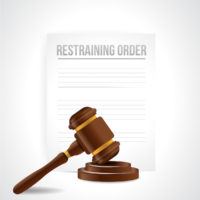
Physical and emotional abuse are more common than we as a society like to acknowledge. Whether abuse has always been present in your marriage or has become a means for a partner to exert control in a failing relationship, you have a right to live free from fear and mistreatment. For many victims, an important step in becoming free from abuse is to obtain a restraining order that prevents contact from a former partner or spouse. Learn about the process of obtaining a temporary restraining order in New Jersey, and contact an experienced Englewood domestic violence attorney for help protecting yourself and your family from a dangerous former partner or family member.
What is the process for obtaining a restraining order?
Victims of abuse may seek a restraining order by:
Going to the Domestic Violence Division of the Family Division at their local county courthouse, or a police station: If the victim is seeking the restraining order during regular weekday business hours, they can approach the court directly to seek the restraining order, but if the order is sought after 4:00 pm or over the weekend, they should go to their local police station.
Completing the court forms: Abuse victims will need to complete court forms requesting that a judge issue a temporary restraining order (TRO). Victims should include as much detail about the alleged abuse as possible, including dates and times that these incidents occurred. If the victim is at the county court, Family Division court clerks can discuss these forms with victims, but they can’t provide legal advice.
Obtaining an order from the judge: If the forms are completed at a courthouse, they will be presented to a judge who will consider the request as soon as possible and, if appropriate, issue a TRO. If the request occurs at a police station, the officer on duty will contact a judge to request that a TRO be issued.
Preparing for a final restraining order hearing: The TRO will remain in place until the court can hold a hearing where both the plaintiff (the victim) and defendant (accused abuser) can present their sides. If the judge believes that the defendant presents an ongoing threat, the court will make the restraining order final. These hearings are typically scheduled within ten days of the TRO being issued. Many abuse victims choose to have a lawyer present at final restraining order hearings so that they can focus on the safety and well-being of themselves and their family while someone with skill and experience manages any investigation or legal argument that should be made.
If you’ve been the victim of domestic violence in New Jersey, get compassionate and dedicated help from experienced Englewood family law attorneys by contacting the law offices of Herbert & Weiss at (201) 500-2151
